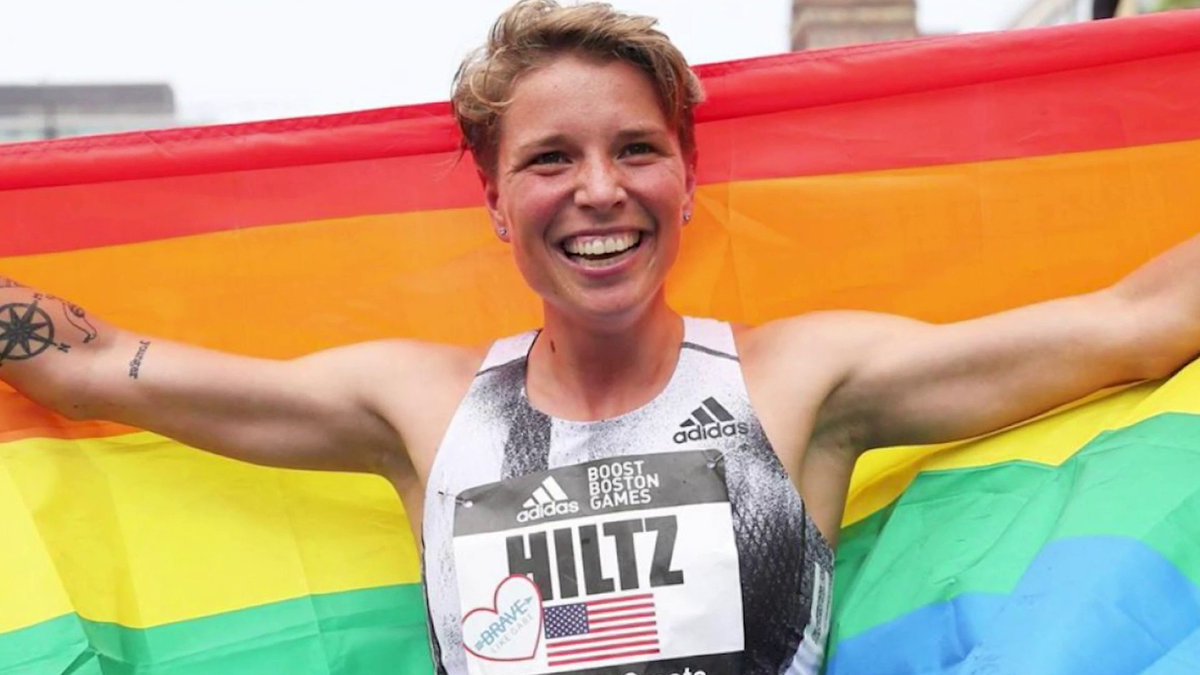In 2016, a slew of bills were introduced in state capitols across the country, all designed with a common goal: to prevent trans people from using public restrooms that correspond to their gender identity. Right-wing politicians suggested wives and daughters were in danger if trans women were allowed to use women’s restrooms. Ads depicted shadowy men entering girls’ bathrooms, and a heated conversation about the legislation entered the public. Threatened by a loss of business and public outcry, these so-called “bathroom bills” largely failed, but that hasn’t stopped right-wing groups from pushing ahead on anti-trans attacks.
Today, right-wing politicians have moved from the bathroom to the locker room in their continued war on trans people. Claiming a need to “save women’s sports” from trans athletes, Republican lawmakers, with the help of religious-right groups, have introduced dozens of bills aimed at preventing trans girls from playing on girls’ sports teams. In 2021, more than 100 anti-trans bills are being considered by state legislators—60 of which focus on excluding trans youth from sports.
Central to this effort is Alliance Defending Freedom, an anti-LGBTQ organization that helped draft the 2016 “bathroom bills.” As discussed in Part I of this investigation, ADF is a leading member of a newly formed coalition of anti-LGBTQ and religious-right groups called Promise to America’s Children. Including such heavy-hitters as the Heritage Foundation, Family Research Council, and Family Policy Alliance and 19 other national groups, the coalition has doubled down on fearmongering about the alleged threat that trans people supposedly pose to cisgender kids, offering draft legislation to interested lawmakers and organizing members of Congress to oppose the landmark federal legislation known as the Equality Act, which would protect the rights of LGBTQ people.
While the focus of many of these bills is sports and competition, the backdrop of these legislative efforts is not: the groups comprising this coalition are eager to win a battle in the culture war by rolling back the progress trans Americans have made, as can be seen by the right’s efforts to block trans people’s access to such basic necessities as bathrooms or gender-affirming health care, not to mention federal civil rights protections.
And there’s good reason to pick sports as a battlefield: Not only can right-wing strategists galvanize the Trump base with fearmongering, but there’s an opening to bring more moderate voters into the right-wing fold. The American public’s love of sports and general ignorance of transgender individuals leaves room for disinformation to fill the void and a distorted conversation about athletic advantages, competition, and biological differences to follow.
Social conservatives have hit on “something potent” by focusing on sports, says LGBTQ activist and writer Charlotte Clymer. But she cautions that while the vessel may be different, the message from the religious-right groups in the anti-trans coalition is not.
“Their goal has been to wipe out trans people from the public square from day one. You know, it’s not just kids [or] these sports; they want to make it so that trans people are not recognized or validated in any aspect of the public square,” Clymer said.
Clymer’s observation of an attempted erasure of trans people may explain why, in tandem with bills banning trans student athletes from teams that comport with their gender identity, bills that seek to ban gender-affirming health care for trans youth are also moving forward. A bill doing just that became law in Arkansas this April, after the legislature overrode the governor’s veto.
The far right’s attacks targeting trans youth are not limited to sports, a fact highlighted by U.S. Sen. Rand Paul, the neolibertarian-turned-hard-right-Trump-defender who is believed to be eyeing a 2024 presidential run. Access to their very medical treatment is in peril, as well.
In February, Dr. Rachel Levine, President Joe Biden’s nominee for assistant health secretary who would become the first transgender federal official confirmed by the Senate, faced a grilling from Paul, who regularly touts his physician’s license as evidence of his expertise in all things medical. (Paul is an ophthalmologist.)
“You have supported both allowing minors to be given hormone blockers to prevent them from going through puberty as well as surgical destruction of a minor’s genitalia,” Paul said to Levine at her confirmation hearing, in an apparent reference to gender reassignment surgery. While puberty blockers can be used in gender-affirming medical treatment, as per CDC health guidelines, gender reassignment surgery for children is not, and there is no evidence that Levine supports such surgeries for prepubescent kids. Paul cited a statement from the American College of Pediatricians, the anti-LGBTQ fringe advocacy group that has joined the Promise to America’s Children coalition, claiming that most children with gender dysphoria experience resolution by late adolescence “if not exposed to medical intervention and social affirmation”—a statement that flies in the face of guidance by the country’s major medical groups.

“Dr. Levine, do you believe that minors are capable of making such a life-changing decision as changing one’s sex?” Paul asked Levine at her confirmation hearing.
“Transgender medicine is a very complex and nuanced field with robust research and standards of care that have been developed,” Levine responded. “And if I’m fortunate enough to be confirmed as the assistant secretary of health, I look forward to working with you and your office and coming to your office and discussing the particulars of standards of care for transgender medicine.”
The exchange landed Paul an invitation to the Family Research Council’s daily radio program “Washington Watch” in March, where FRC President Tony Perkins applauded Paul’s performance at the Levine hearing.
“[W]hat’s amazing about being labeled as a ‘hater’ is that I never even mentioned Levine … [or the] things that she’s done to herself. I never asked that at all. I just asked whether a minor, whether a 10-year-old, could override parental consent,” Paul told Perkins. He also said kids should not be affirmed in clinics supporting trans kids, suggesting that four or five people will surround the kid and convince them they are trans when they are not.
In the print version of his interview with Paul, Perkins (who has likened accepting trans people to allowing someone to believe they are a bird, and then watch as, in an attempt to fly, they jump off a building to their death) used brackets in Paul’s quote to change “she” to “he,” purposefully misgendering Levine. “Senator Paul, not caring how the media would savage him,” Perkins wrote, “decided to ask some pointed questions about how Levine’s transgender agenda would impact the children of this country.”
When Levine was confirmed, FRC issued a press release slamming her appointment and, again, misgendered her.

Of the 89 pieces of legislation specifically targeting trans youth either passed in state legislatures or under consideration by state lawmakers this year, 29 focus on gender-affirming health care for children and would directly interfere with a patient’s relationship with their doctors and parents, according to the ACLU.
In Arkansas, the Republican Gov. Asa Hutchinson, who this year signed two different anti-trans bills—including one that bars trans kids from playing on sports teams matching their gender identity—vetoed a bill supported by FRC’s lobbying arm and the American Principles Project (both members of the Promise to America’s Children coalition) that even Hutchinson found too extreme because of its proscriptions on medical care specific to trans youth. On April 6, the state legislature overrode the governor’s veto, making it illegal for transgender minors to receive gender-affirming medical care.
In addition to campaigning against the Equality Act (the federal legislation that would enshrine into law equal treatment under law for LGBTQ people) and gender-affirming health care for trans youth, right-wing groups in the Promise to America’s Children coalition have protested any legislation that would recognize the existence of transgender individuals. But for all of their protestations that their opposition to equality for trans people is ostensibly for the protection of women and girls, these groups are united in opposition to the Equal Rights Amendment, which would prohibit discrimination on the basis of sex, and have gone as far as to object to reauthorization of the Violence Against Women Act on the grounds that its protections extend to trans women.
Steve Bannon, Trump’s former White House chief strategist, invited Terry Schilling, president of the American Principles Project, to his “War Room: Pandemic” podcast to discuss an anti-trans digital ad launched by APP to fearmonger about what it claimed to be unfairness in allowing trans girls to compete in sports against cisgender girls. Joining as the singular female voice was his daughter, Maureen Bannon, who played volleyball at West Point and hypothesized about what would’ve happened if she had to compete against a trans woman or had a “guy” on their team. “It would be crushing,” she said. “They can jump higher. We’re biologically different. So there’s no comparison. It’s not fair. Women need to be biologically women in the sport, men need to stay in their sport.”
After Mo, as Steve affectionately called her, urged viewers to fight for “biological women,” and Schilling accused “the transgender lobby” of co-opting gay rights groups, Bannon asked why state attorneys general had not filed temporary restraining orders to challenge the Biden administration’s Jan. 20 executive order aimed at preventing discrimination on the basis of gender identity or sexual orientation, which right-wing groups claim will destroy women’s sports.
“They’re not hearing from their voters enough,” Schilling replied.
“Why is that?” Bannon pressed.
“Look, the women’s sports issue, it’s important for a girl-dad like you and I, Steve,” he said. “But it’s still a niche thing. It’s because we’ve been beaten into submission.”
Schilling continued. “This is branded way too much towards women and the Olympics when really we need to focus on the high school athletes, the college athletes, because that’s the biggest point of this; that’s the opportunities that get them out of poverty,” he said.

The exchange highlighted the extent to which many of these groups care about women’s sports in actuality (apparently very little); the strategy to focus on kids; as well as the reality that voters aren’t clamoring to call on lawmakers to bar trans girls from sports (perhaps because it’s mainly a manufactured issue created by religious-right groups). That’s not to say that arguments about “fairness” and protecting children won’t have legs; as is evident from the 2021 legislative season, lawmakers beholden to religious-right groups have already gone ahead and passed laws based on this misleading framing.
“They’re picking the battlefield. And they are being successful because they’re picking sports,” Heron Greenesmith told Right Wing Watch.
There’s good reason for the right wing to focus on this question of “fairness” in sports—it allows them to avoid the “bigot” label, even as they invite bigots to the table to spout their own bigoted attacks. And Americans of all political stripes support notions of fairness.
Right-wing women like Rep. Marjorie Taylor Greene or South Dakota state Rep. Rhonda Milstead, who spoke on a panel on transgender women in sports at the 2021 Conservative Political Action Conference in Orlando, Florida, co-opt feminist terms and say they’re just trying to protect Title IX (the federal law that requires educational institutions receiving federal funding to offer equal opportunities to women, including in athletics) and women’s empowerment through sports. “If we allow males to compete in girls’ sports, we’re telling those females that they aren’t important, and what is that going to do to our future?” Milstead said at that panel, employing the argument that giving one group rights takes rights away from another. “If we take that away from them, we’re telling them that’s not important anymore.”
But focusing on “fairness” can also bring in more moderate Republicans into the fold, as demonstrated by Sens. Mitt Romney and Susan Collins. During Miguel Cardona’s hearing for education secretary in February, Rand Paul slammed Cardona for supporting policies that allow trans kids to compete on teams corresponding to their gender identity; Romney defended Paul’s line of attack, regurgitating his framing of women’s sports under threat by “boys”: “They shouldn’t be competing with people who are physiologically in an entirely different category. And I think boys should be competing with boys and girls should be competing with [girls] on the athletic field.” Likewise, Sen. Susan Collins, who once supported the Equality Act, has since changed her tune on the piece of legislation, questioning, among other things, whether its protections of trans women would hurt cisgender female athletes.
That change of tune is what leaders in this coalition of groups are aiming for among the broader population. By capitalizing on Americans’ general ignorance of trans people, they can fill the void with disinformation. Trans girls are referred to as “boys,” and girls are portrayed as needing a special layer of protection.
And bigots do circle below, glomming on to this narrative, and hurling accusations at any woman seen as too muscular as trans, and thus, not a “real woman.”
Mario Murillo, a right-wing evangelist based in California, smeared proponents of the Equality Act as people who are preying on children. “They want our children to believe gender is based on feelings. Once that is codified, leftist teachers will prey on the feelings of our children,” he said in a blog post on his website. “They are also trying to make being transgender cool—not just equal. By making transgender cool, they add another devastating weapon: peer pressure. How many of our children are acting out gender dysphoria just to win peer approval in school and on social media?”

“The real target is womanhood and the consequence will be to erase women altogether,” he added. The photo accompanying the blog post featured a large, muscular woman facing off against a much shorter opponent, superimposed with the words “Have you told your young daughter how Democrats want to erase women?” The muscular woman Murillo suggests is trans is, in fact, 6’2” cisgender Brazilian mixed martial artist Gabrielle “Gabi” Garcia.
For Heron Greenesmith, it’s the fact that we’re even talking about sports that angers them.
“There’s no good faith engagement on sports rhetoric,” Greenesmith said. “It’s all bad-faith engagement from the beginning … there isn’t even an issue here.”
It may be an argument in bad faith, but the framing has taken hold, perhaps reaching a tipping point among the general public. In a Morning Consult/Politico survey taken the week following this year’s CPAC, at which former President Donald Trump addressed the crowd with transphobic comments, registered voters were informed that Mississippi was looking to ban transgender athletes from participating on female teams in high school and college and asked, “Based on what you know, do you support or oppose banning transgender athletes from competing on women’s sports teams?”
Fifty-three percent of respondents supported such a ban, with Republicans leading the way with 70 percent expressing their support for the sports ban. A third of respondents opposed.
As Clymer pointed out, there’s no context for the question, no attempt to dissuade the reader from preconceived notions of trans people or disinformation that has seeped into their news and social media feeds. Nevertheless, the topic is here, being pushed through conservative talk show airwaves, websites, and social media feeds and into the broader public. And so the American public—which is overwhelmingly in favor of policies that prevent discrimination against trans individuals—still asks: Is this an issue? Do trans female athletes have advantages?
Schulyer Bailar, the first trans man to compete on a Division I men’s team and an LGBTQ activist, is all too familiar with this line of questioning. “We’re talking about Joanna trying to play with Suzy on the soccer field. It’s not a big deal,” he said.
“I think that people most often miss that these conversations are not about Olympic athletes. They’re not about even NCAA athletes because the NCAA already has rules there. They attack children,” Bailer said, pointing to the legislation introduced in 31 states just this year that would excluding transgender youth from athletics. “It’s so imperative to remember that we’re talking about kids who have, for the most part, no significant biological advantages that impact sport. And so they should be just allowed to play.”
Current medical research on prepubescent kids backs that. As for college athletes, the NCAA has had policies in place for transgender athletes for over a decade, requiring trans women who have undergone hormonal treatment to have done so for at least a year. The Olympics have allowed transgender athletes to compete since 2004, requiring athletes keep their testosterone below a certain level. These policies pull from the limited amount of research on trans women and trans athletes.
There are two important factors when considering whether trans girls and women have any advantage over cisgender girls and women, says Joanna Harper, a PhD researcher studying trans athletes at Loughborough University’s School of Sport, Exercise and Health Sciences in the U.K. and a consultant to the International Olympic Committee. “One is whether or not the trans woman has gone through male puberty, and whether or not she has gone through a course of gender-affirming hormone therapy,” she says.
If a trans woman has not gone through male puberty, then she does not have any measurable athletic advantage over a cis woman, Harper explains. In other words, Joanna and Suzy are on the same athletic playing field, regardless of any differences in gender assignment at birth between them.
The second group of trans women are those who have gone through male puberty. “If we take the case of trans women who haven’t gone through hormone therapy, then theoretically, they would have the same physical advantages as cisgender men,” she said.
But for a trans woman who has experienced male puberty, a year of hormone therapy, which lowers her testosterone levels to female levels, will cause her to lose a significant amount of her athletic capabilities. In trans women, levels of hemoglobin, a blood protein whose levels are closely tied to testosterone and comprise the most important parameter for endurance athletes, drops to the same range as that of cisgender women, and any advantage she may have had there is completely lost.
“Trans women will lose speed or lose strength, endurance, and pretty much anything except height; height isn’t going to change,” said sports researcher Harper, adding that even bone structure will change, albeit very slowly. She notes that trans women will lose a significant amount of strength but limited research suggests they retain an advantage over cis women, although they are left with less strength to power what are usually bigger bodies.
When people point out that advantages like height don’t change, Bailar says he won’t argue, but he challenges them to rethink such reasoning.
“I will remind you that biological differences are everywhere, including and especially in sport, and do they offer advantages sometimes? Of course. Is that unfair? Probably not,” Bailar said, pointing to athletes like Michael Phelps, the winningest Olympian of all time whose body, which produces half the amount of lactic acid as others, has been celebrated and declared made for swimming. “There will always be great athletes, and sometimes that’s because they have great bodies. But they also have to work their butts off.”
Harper agrees. She encourages the public to reframe how they view competition with trans athletes. “We allow advantages in sport. We let left-handed baseball players compete against right-handed baseball players even though the left-handed baseball players have many advantages. What we don’t allow in sport is overwhelming advantage. We don’t let heavyweight boxers get into the ring with flyweight boxers,” Harper said. “So the important question isn’t, do trans women have advantages? The important question is: Can trans women and cis women compete against one another in a meaningful fashion?”
And having a body that will supposedly give a girl or woman an advantage doesn’t mean that she’s actually going to excel in the sport. Some trans women, like any woman, are good at sports; some are not. But when trans women win, people take note.

“So when the young trans woman loses, no one gives a shit, no one no one cares. It’s when she wins, that it suddenly becomes a problem,” Clymer said, noting that often the scrutiny is put on Black and brown trans women or those with different bodies, as in the case of Caster Semenya, whose body produces more testosterone than the average woman and was temporarily barred from competing, or the Black trans high-school girls track athletes in Connecticut, one of whom won a state championship but lost twice to one of the cisgender plaintiffs, another state champ.
In February 2020, three cisgender plaintiffs, with the help of Alliance Defending Freedom, filed a federal lawsuit against the Connecticut Association of Schools for its trans-inclusive policy, naming two trans girls against which they competed.
One of the trans girls in the Connecticut case ran the winter track season on the boys’ team and the spring season on the girls’ team. A case like that, Harper explains, is extremely rare—so rare that it’s the only such case of which she knows.
That Connecticut case, rare as it is, has been the focus of anti-LGBTQ groups’ clarion call that states must change their laws on trans kids’ participation in sports. It is, as Greenesmith said, an argument made in bad faith that attacks kids who, for the most part, just want to play on the same team as their friends.
The legislation targeting high schoolers has disgusted Harper because, she maintains, it’s simply unnecessary—not to mention extremely harmful to the trans community. “But now you have all of these politicians who are trying to score points with their base, saying, ‘We need to protect women’s sports,’” she said. “These aren’t people who care about sports, these are the same people who, until 2015, were fighting against same-sex marriage.”
And the legislation—some of which would require student athletes accused of being trans to submit to an internal and external examination of their reproductive organs—could spell trouble for girls’ and women’s sports, harming girls who don’t fit into the stereotype of what it means to be feminine.
“The reality is trying to exclude trans women is what will add to the destruction of the women’s category because in order to exclude trans women, you have to know which ones are trans,” Schuyler said. “Most states are proposing accusation-based testing, which means I accuse you of being trans, you get tested, and then you either get thrown out or you don’t based on whether or not you’re trans.” That means a girl who is accused of being trans can be required to have her genitals examined, have her hormones tested, and undergo other examinations of her genetic makeup, which Bailar notes, is incredibly invasive and is likely to target Black and brown girls.
“So it polices—it puts a cap on women’s performance and women’s looks and women’s presentation,” Bailar says. “I think it’s really important to recognize that this idea of including women, trans women in sport is actually not what’s going to destroy women’s sport. The actual act of excluding is what will help destroy women’s sport.”
